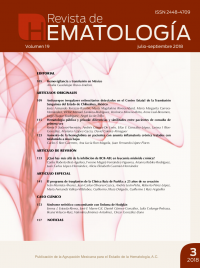What is beyond the inhibition of BCR-ABL in chronic myeloid leukemia?
Rev Hematol Mex. 2018 julio-septiembre;19(3):133-140.
Carlos Roberto Best-Aguilera, Yvonne Magaly Fernández-Figueroa, Arianna Robles-Rodríguez, Juan Carlos López-Hernández, Alicia Elizabeth Guzmán-Hernández
Departamento de Hematología, Hospital General de Occidente, Zapopan, Jalisco, México.
Resumen
El advenimiento de los inhibidores de la cinasa de tirosina constituyen un parteaguas en el tratamiento de la leucemia mieloide crónica; sin embargo, un grupo significativo de pacientes no se benefician de este tratamiento, ni ha probado ser capaz de erradicar de forma definitiva las células madre leucémicas Filadelfia positivas. En consecuencia, existe investigación activa en diversos frentes de la biología tumoral que implica las vías de señalización para supervivencia y proliferación celular, la respuesta inmunitaria y el nicho protector de la células madre leucémicas Filadelfia positivas. En este artículo se revisan estos aspectos y se reflexiona acerca de las estrategias presentes y futuras para la curación definitiva de la enfermedad.
PALABRAS CLAVE: Leucemia mieloide crónica; cromosoma Filadelfia; cinasa de tirosina.
Abstract
The arrival of the tyrosine kinase inhibitors (TKI) to the clinical setting is a milestone in the treatment of chronic myeloid leukemia; however, a significant group of patients do not reach any benefit from this therapy, and also it has not proven to definitively eradicate the Philadelphia + leukemic stem cell (LSC). Consequently there is an active research on several fronts of the tumor biology that involves the signaling pathways for survival and proliferation, immune response and the protective niche of the LSC Ph+. In this paper, we review these areas and also some considerations about the present and future strategies for the definitive cure of the disease.
KEYWORDS: Chronic myeloid leukemia; Philadelphia chromosome; Tyrosine kinase.

